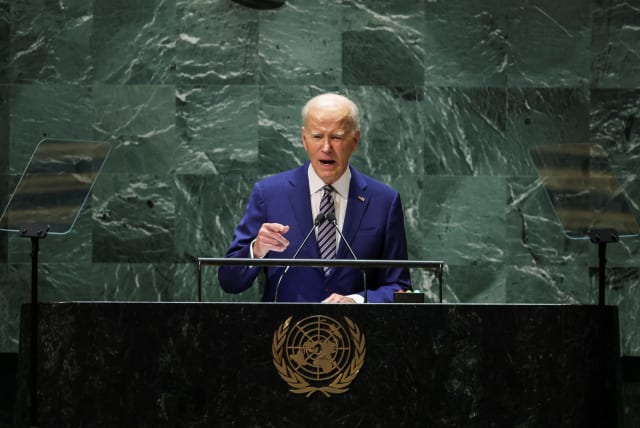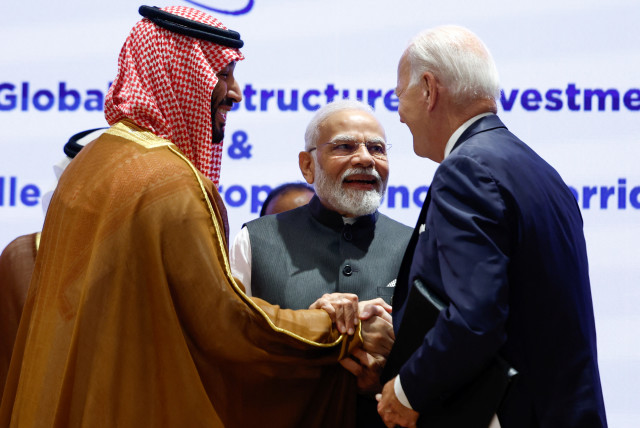Biden: US to work for Israeli normalization and two states

Biden set out his country’s foreign policy agenda at the 78th opening session of the UN General Assembly.
NEW YORK – The United States plans to seek both the normalization of the Jewish state with its Arab neighbors and a two-state resolution to the Israeli-Palestinian conflict, US President Joe Biden told the United Nations on Tuesday.“Israel’s greater normalization and economic connection with its neighbors delivering positive and practical impacts even as we continue to work tirelessly for just and lasting peace, for Israelis and Palestinians, two states for two peoples,” he said.
Biden lays out US foreign policy
Biden set out his country’s foreign policy agenda as one of the first speakers to address the high-level portion of the 78th opening session of the UN General Assembly.He spoke in advance of his highly anticipated meeting on Wednesday morning with Prime Minister Benjamin Netanyahu on the sidelines of the UNGA’s weeklong event that draws heads of state and governments from many of the UN’s 193 member nations.The importance of regional cooperation as a blueprint to solve global crises and conflict, including in the Middle East, was one of his central themes.Biden referenced specifically the new energy corridor the US announced that would link Europe to India through the Middle East, touching Israel, Jordan, Saudi Arabia, and the United Arab Emirates.
This, he said, “will spur opportunities for investment across two continents” and is part of “our efforts to build a more sustainable and integrated Middle East.”Biden hinted that the partnerships the US is helping foster between Israel and its neighbors have little to do with Iran’s nuclear threat.“None of these partnerships are about containing any country, they are about a positive vision for our shared future,” he said.Still, Washington is pushing for a security pact with Riyadh that would normalize ties with Israel, but Biden did not specifically address that burgeoning deal in his UNGA address.He also warned that the US would work to ensure that “Iran never acquires nuclear weapons.”The US president stressed the importance of democracy, an issue that has been a sticking point between him and Netanyahu.Biden has opposed Netanyahu’s judicial reform plan, which the prime minister has argued will strengthen democracy but which his opponents fear will transform Israel into a dictatorship.“We will defend democracy as our best tool to meet the challenges that we face around the world,” Biden said.The US is “working to show how democracy can deliver in ways that matter to people’s lives,” he added.The issue of Netanyahu’s judicial reform plan and the possibility of a Saudi-Israel normalization deal are among the topics the two men are expected to discuss on Wednesday.It’s their first face-to-face meeting since Netanyahu took office at the end of December. Netanyahu had hoped that he could meet Biden in Washington, but the US president has yet to extend an invitation to him to the White House.Biden, however, is hosting Ukrainian President Volodymyr Zelensky at the Oval Office on Thursday, rather than on the sidelines of the UN.Netanyahu, whose trip this week from Israel has been marred by protesters who have rallied against him in New York and California, has, however, filled his schedule with a number of high-level meetings.These included with Zelensky and Erdogan later Tuesday, as well as with German Chancellor Olaf Scholz. In their conversation, Netanyahu spoke about Iran, explaining that Tehran’s statement on “the expulsion of some of the IAEA inspectors from the nuclear installations in Iran is unacceptable,” according to his office.The two men “also discussed enhancing bilateral security cooperation, especially the recent agreement to provide the Arrow 3 air defense system, which was pursuant to the recent strategic dialogue between Israel and Germany led by the two countries’ national security advisers,” the PMO said.The meeting was attended by the “strategic affairs minister, the prime minister’s chief of staff, the director of the Mossad, the director of the National Security Council, the cabinet secretary, the prime minister’s military secretary, the Israeli ambassador to the UN, and the prime minister’s diplomatic adviser,” the PMO explained.Netanyahu is also expected to discuss with Biden the danger of Iran’s nuclear program.
Jerusalem Post Store
`; document.getElementById("linkPremium").innerHTML = cont; var divWithLink = document.getElementById("premium-link"); if (divWithLink !== null && divWithLink !== 'undefined') { divWithLink.style.border = "solid 1px #cb0f3e"; divWithLink.style.textAlign = "center"; divWithLink.style.marginBottom = "15px"; divWithLink.style.marginTop = "15px"; divWithLink.style.width = "100%"; divWithLink.style.backgroundColor = "#122952"; divWithLink.style.color = "#ffffff"; divWithLink.style.lineHeight = "1.5"; } } (function (v, i) { });

